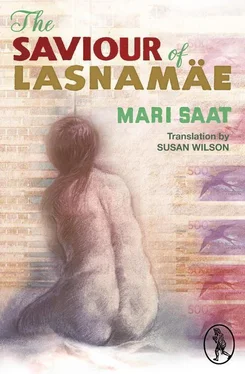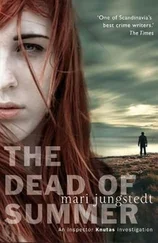Mari Saat
THE SAVIOUR OF LASNAMÄE
Translated by Susan Wilson
“A soul butterfly…” thought Dmitri Dmitrievich and flinched – but butterflies weren’t out at this time of the year, were they? There are no butterflies in winter.
Natalya Filippovna had little reason not to be content with her life: she earned the average wage in Estonia, sometimes a shade more. No small thing for a woman on the wrong side of forty-five who couldn’t speak the official language. Actually, that wasn’t entirely true – she could understand it and even say a few simple things; it was just that she couldn’t shake off her thick accent, and the writing was so foreign-looking… and after all there’d been no need for it before: the Estonians all used to speak Russian, but now – well, the younger ones couldn’t… and the older ones wouldn’t…
Natalya Filippovna’s life had, broadly speaking, settled down nicely: she had a handsome two-room flat in Lasnamäe that had been allocated to her thanks to the birth of her daughter. Well actually, thanks to her job in the building industry and the birth of her daughter: she had been one of the last people to be allocated a flat by a workplace and her daughter’s birth had pushed her ahead of the competition – ahead of unmarried women who had not produced a child. Women like that had had to stay in the hostel and there was no dishing out flats to people after that. Mind you, she’d have had no flat at all if she’d stayed on at the kindergarten – there were never any flats for kindergartens to allocate. She’d have been happier at the kindergarten though…
Nowadays she’d have had to buy the flat herself or build it – the state wouldn’t give you anything any more, but what could you buy or build when even a shack cost over a hundred thousand, and the only way prices ever went was up, but take-home pay was only four and a half thousand, in a good month five or even five and a half if you’d had to work Saturdays and Sundays or if there’d been rush orders… But one and a half thousand of that was swallowed by the cost of the flat once you’d taken off the electric and telephone, another one and a half went on food, and the remaining one and a half was simply not enough to make ends meet for the two of them. They always got through another two. If only her daughter would eat sausage stew and fried potatoes, but she wouldn’t. She would not eat meat. She wanted fruit and puddings… And travel tickets, soaps, shampoo, tampons – her daughter needed tampons too now… And there was the constant need for money for school or art school – exercise books, paints… And that music player that she had to have on all the time – just look how much the batteries for that cost. Good job that she could get clothes second-hand, but shoes really had to be bought from a shop… or the market. Mind with the market you never had any way of telling how long they were likely to last. Once a sole wore right through in two weeks, and there was no one you could complain to… All told, she’d never had as much as five hundred spare in a month…
Natalya Filippovna had a dream that if she could scrape together ten thousand over the winter, she’d be able to afford a proper holiday for the two of them somewhere in Europe… They always ended up arguing about it – Sofia wanted to go to Holland where there were canals and tulip fields, but Natalya Filippovna wanted to go somewhere where there were mountains – warm sun and jagged snowy mountain peaks… Last time she’d been to Crimea – it felt like aeons ago… It was still deep in the Soviet time – as the Estonians called it. Everywhere was one great Union – no need for any visas. You just made up your mind and off you went to Crimea. Using a travel voucher to boot… There were no real snowy peaks there of course, but there was hot sunshine and the sea was a warm, dark blue, not always cold and grey like here. It was there that she’d met Sofia’s father… Sofia’s father… it almost felt out of place to talk about him like that because there ought to be something solid about a father, even a touch of menace, but instead he was like a faint, warm breath of wind that merely caresses you and vanishes, or the headiness of a light, clear wine that evaporates, as if it had never existed, just like a dream…
That was all to the good to Natalya Filippovna’s way of thinking. She was plenty old enough already to be happy with just the child, and she’d never hungered after men, unlike some of her friends who settled for the bluster and even the beatings of a drunk just so long as they could have a shag… She’d been through all that – from shagging to beatings, when as a young woman she was married to Corporal Grisha and as a result moved thousands of kilometres away from home to find herself here on the shores of the grey sea in the wet land of the Estonians… Actually they’d been through several places before they’d ended up here… But it was here that she’d thought for the first time that it wasn’t right. It was that time when she was lying in hospital that she’d thought that it wasn’t right for her husband to beat her, never mind whether he was drunk or in a bad mood, and cause a miscarriage… she shouldn’t settle for it… Perhaps she started to think that way because of the climate here or the people – the fact that the people here were so correct and the women were always discussing what was right and what was wrong… not “he loves me” “he loves me not” or “lucky” and “unlucky” but simply “right” and “wrong” or “who has the right” – as if there were a ruler inside them that could always draw the line between right and wrong, and if you were always on the side marked “right” then everything was fine. The women here often lived alone, brought up their children alone, not always because their husbands had left them, but because they felt it was right. Natalya Filippovna liked these independent-minded women. Why couldn’t she live like that too? She had the feeling, however, that it was only here in this wet, grey land that she would be able to think and live that way – if she went back to somewhere in Russia, perhaps beyond the Urals again where she had come from, she would have to live life differently, accepting, putting up with… But she did not want to!
And anyhow, her child was enough for her. The child that she’d found herself expecting, rightly or wrongly, that was something else she really wasn’t sure about… Quite simply, she wasn’t so alone… she had someone to live for… And work was stressful enough as it was. Watching the soaps on TV was as much as she could manage in the evenings… Earning more than the Estonian average wage was not an easy thing to do. As for having a man to look after as well… no way!
Natalya Filippovna worked in a large electronics factory. There she soldered components the size of specks on to circuit boards. She worked on the circuit boards that were fitted inside machinery, telephones or any other equipment, making the pathways through which electrons would flow, quick as a flash, at lightning speed… The work was precise and quick, they said it was for people under forty-five, but she managed all right because she had always been precise and nimble enough. She had no problem with the work – in a warm clean room. Of course she had to do shifts and when there were rush orders she had to be there on Saturday and Sunday too, but she was paid extra for that… and the factory bus took her to and from home. She was already over forty-five but productivity – speed and quality – was monitored and she was always rated a little above average. The key thing was to last out at least the few years until her daughter had finished school.
Читать дальше












